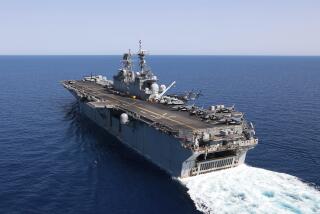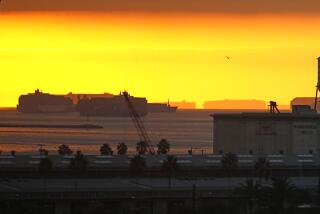Coast Guard Sometimes Gives Heads-Up on Search
- Share via
WASHINGTON — The Coast Guard said Saturday that in situations where the likelihood of security threats is considered low, it sometimes alerts captains of arriving ships of an impending search.
The practice is meant to reduce delays and the expense of paying workers to wait unnecessarily to unload cargo, it said.
The Coast Guard has a system for setting search priorities, officials said, that results in some ships being searched with little or no advance notice.
Coast Guard officials were responding to an article in the New York Times on Saturday that questioned the policy of notifying ships in advance of a search.
Officials discounted the notion that every search must be a surprise to be effective.
“Sometimes we will board low-priority ships,” said Coast Guard Lt. Tony Migliorini, a spokesman for the Los Angeles-Long Beach sector. “We are trying to assist them. It does not hamper our security mission because we will be able to search where we need to search, regardless.”
“Twenty-four hours is the maximum amount of warning that we give. Sometimes we give them just a few minutes. Sometimes it’s a few hours. This has been our process since 9/11,” Migliorini said.
Usually, the ships are searched at sea when they are nearing port, officials said.
A full search could delay its arrival by hours or as much as a day, they said. A boarding party from the Coast Guard, sometimes accompanied by bomb-sniffing dogs, might go aboard to check the crew and the cargo.
Since the Sept. 11 attacks, the Coast Guard has stepped up its searches of ships entering U.S. ports, but officials emphasized that the Coast Guard checked inbound vessels for a variety of reasons, not all of them related to security.
“The mission objective of each foreign vessel examination or boarding is carefully measured to accomplish an achievable end. This mission objective might be enhanced by the withholding of information from ship management or by the sharing of information with ship management,” Cmdr. Paul D. Thorne, chief of the Coast Guard’s Foreign and Offshore Vessels Division, said in a statement Saturday.
“The discretion of information-sharing is largely, but not solely, within the hands of the captain of the port and may not present a uniformity on a national scale,” he said.
Federal officials responsible for port security have long sought to develop systems for focusing on likely threats and identifying shippers that appear to pose relatively low threats. They have also acknowledged that it is not feasible to disrupt the transportation system on which major segments of the U.S. economy depend.
In striking this balance, officials indicated, they try to avoid imposing additional costs and delays on shippers when security concerns are low.
One such effort involves reducing dockside costs that can be increased by a surprise search.
“The longshoremen are union, and as soon as they show up they start getting paid. So the shipping lines are shelling out money,” Coast Guard spokesman Migliorini said.
“There is a great relationship between industry and the Coast Guard,” said Daniel Tremper, a Coast Guard spokesman in Washington.
Times staff writer Ronald D. White in Los Angeles contributed to this report.
More to Read
Sign up for Essential California
The most important California stories and recommendations in your inbox every morning.
You may occasionally receive promotional content from the Los Angeles Times.










